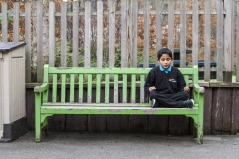Disaster is here, but the lawn looks good: Why we fail to act on the things that matter most
Disaster is here, but the lawn looks good: Why we fail to act on the things that matter most
Why you can’t stop climate change like you stop a pandemic, and what that has to do with mowing the lawn. We are in crisis, yet our day-to-day routines persist. While I was walking my dog the other day, I couldn’t help but notice how well-kept all the front yards looked. The lawns were mowed and the bushes were trimmed. Our ability to tend to the minor aspects of our lives while fighting to save our very way of being... / more
Technology-Facilitated Child Sexual Exploitation and Abuse (CSEA): the ‘Flaw in the Law’
Technology-Facilitated Child Sexual Exploitation and Abuse (CSEA): the ‘Flaw in the Law’
Recent figures suggest that the number of young people falling victim to sexual abuse online continues to rise. Given the substantial impact such experiences can have, we are challenging whether current legislation understands the true nature of such offending and reflects the actual harm caused. The rise in ‘online grooming’ According to recent figures published by the National Society for the Prevention of Cruelty to Children (NSPCC), over 5,000 offenses of ‘online grooming’ were recorded in the 18 months prior... / more
Toward the LGBTQ+ Friendly Workplace: Are We There Yet?
keywords:
LGBTQ, Workplace Issues, Diversity, Inclusion, prejudice
Toward the LGBTQ+ Friendly Workplace: Are We There Yet?
Gender and sexual minorities in the United States still face discrimination and a number of challenges. What are the workplace experiences of LGBTQ+ individuals and is the modern organization LGBTQ+ friendly? Read more to find out. With the 50 th anniversary of the Stonewall riots marked by June of 2019, it is important to reflect on advances for the LGBTQ+ community over the past 50 years. The Stonewall riots, among many uprisings of the time, are largely considered the primary... / more
Darkness All Around: Humor, Personality, and Creativity
Darkness All Around: Humor, Personality, and Creativity
Dark humor [1] is harsh and horrendous humor that makes fun of taboo or serious subjects (e.g., jokes on otherwise traumatizing things/events such as dead babies, the holocaust, terminal illnesses, etc). As can be expected, these are often disputed topics within the broader gamut of humor. Some laugh heartily at the expense of others, while some may find such insinuations extremely offensive. The fact that people react differently to such jokes make individual differences within humor styles apparent. For instance,... / more
The Kids are Alright? An Interview with Well-Being Ambassador Will Williams and a Case for Bringing Mindfulness to Schools

keywords:
meditation, well-being, mindfulness, education
The Kids are Alright? An Interview with Well-Being Ambassador Will Williams and a Case for Bringing Mindfulness to Schools
The No Good Terrible Very Bad Day Imagine the last bad day you had. Maybe you were jolted out of a pleasant snooze by a complaining alarm. You’re late. You’re groggy and in your haste, you spill half your breakfast on a freshly cleaned shirt—and the other half now lies in a puddle on the floor. You frantically try to clean it up as you scramble out the door to catch your ride. You look like a marathon runner at... / more
Call for Papers: Special Issue on Sexuality
Call for Papers: Special Issue on Sexuality
We invite you to submit short review articles for a Special Issue on Sexuality at In-Mind Magazine, the online journal of the In-Mind Foundation. In-Mind Magazine is a peer-reviewed online journal that publishes short reviews of topics in all fields of psychology. Our outlet is unique—articles are written for a broad audience, and intended to inform the general public about psychological trends and research. This gives you the unique opportunity as an author to speak directly to the public ,... / more
No Excuses! Lay Judges Reject Exhaustion as a Reason for Failing to Help Others
No Excuses! Lay Judges Reject Exhaustion as a Reason for Failing to Help Others
Imagine that your spouse has promised that they will wash the dishes cluttering your sink this evening; but, when they arrive home exhausted after a stressful day of back-to-back meetings and skipped meals, they try to pawn the responsibility back off on you. Would you soften your judgment of your spouse on account of their fatigue? / more
Roadblocks to Mental Health Research
Roadblocks to Mental Health Research
Another busy ward round: a telephone rings; a nurse apologises to patients that the ward is too short-staffed to facilitate their leave this afternoon; a junior doctor furiously types up their notes whilst simultaneously explaining to a healthcare assistant how to check the observation charts; there is a strong smell of coffee and the telephone continues ringing, unanswered. With the day-today demands of healthcare, it is often challenging to also implement research. However, mental health problems are one of the... / more
How to get into shape like the Hulk

keywords:
exercise, habits, health, self-regulation, self-control
How to get into shape like the Hulk
Do you want to get into shape but find it hard to carry out your good intentions? The Hulk can help you! After summer vacation, chances are you are trying to get back into shape. Your goals may include fitting into your pants again, training for a 5k in the winter, or improving your overall physical strength and endurance. Each day you try to start off with a proper breakfast and intend to do a workout session in the evening... / more
Call for Blogs and Bloggers
Call for Blogs and Bloggers
Call for Blogs and Bloggers: In-Mind Magazine We invite you to submit a blog (1,000 words or less) for In-Mind Magazine, the flagship online journal of the In-Mind Foundation. In-Mind Magazine is a peer-reviewed online journal that publishes short reviews of topics in all fields of psychology. Our outlet is unique—articles are written for a broad audience, and intended to inform the general public about psychological trends and research. Our blog section at In-Mind complements our peer-reviewed articles and includes... / more





